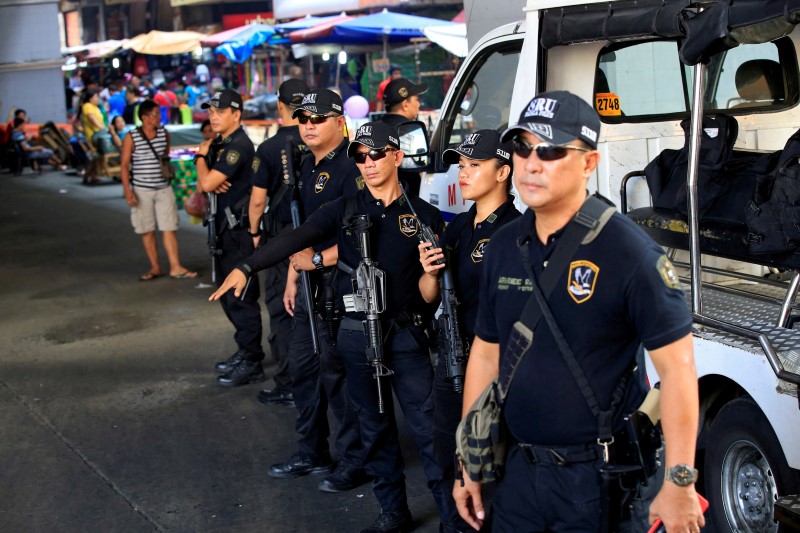By Manuel Mogato and John Chalmers
MANILA (Reuters) – Two things catch the eye in the office of Joselito Esquivel, a police colonel enforcing a national crackdown on drugs in the Philippines’ most crime-ridden district: a pair of boxing gloves in a display cabinet and an M4 assault rifle lying beside him.
“It’s all-out war,” the Quezon City officer says of a spike in killings of suspected drug dealers by police across the country since last month’s election of Rodrigo Duterte, a tough-talking city mayor, as the country’s president. “Duterte has already given the impetus for this massive operation.”
Duterte has vowed to wipe out drug crime within six months but, according to Chito Gascon, head of the Commission on Human Rights (CHR), the aggressive rhetoric behind his promises has already instilled a sense of impunity among the police.
“Basically, you have Mr. Duterte saying: ‘It’s okay, I’ve got your back’,” said Gascon.
On average, at least one person has been shot dead by police or anonymous vigilantes every day since the May 9 election that swept Duterte to power, an escalation from the first four months of the year when the rate was about two a week.
Handwritten warning signs have been left on some corpses.
Duterte, who will be inaugurated on Thursday for a six-year term, has cheered the police on: after a druglord was killed in a northern province recently, he travelled there to congratulate them and hand over a reward worth about $6,000 (£4,492).
Critics, including leaders of the influential Roman Catholic church and human rights advocates, fear a spiral of violence could lie ahead for the Philippines if vigilantism and summary executions become an accepted norm after Duterte takes office.
“My concern is that instead of law and order, what we will see is lawlessness and fear,” said Gascon. “What will result is an increase in the body-bag count.”
On Monday, Duterte branded as “stupid” human rights groups and lawmakers who have complained about his draconian plans to crush crime and re-introduce the death penalty.
“When you kill someone, rape, you should die,” he told his last public meeting as mayor of Davao City, where death squads have killed hundreds of drug-pushers, petty criminals and even street children since 1998, according to rights groups.
Duterte denies any involvement in the vigilante killings.
A political outsider whose coarse defiance of the traditional ruling class has drawn comparisons with Donald Trump, Duterte has even figured in commentaries on Britain’s vote to leave the European Union as an example of a global trend towards populism triumphing over the establishment.
POLICE COVERING THEIR TRACKS?
Duterte’s pick to be the country’s police chief, Ronald dela Rosa, concedes that some recent killings may have been carried out by officers involved in the drugs business who were covering their tracks so that the new president does not go after them.
“That could be true,” he told Reuters. “Some police officers are shifting from drug protectors to drug punishers.”
But dela Rosa added that so much work towards wiping out drug crime has been accomplished recently that his job will be easy when he takes over at the end of this week.
Railing against critics, he said most of the victims in the recent wave of killings were shot by police in self-defence.
“I have no problem how many people die in legitimate police operations, the police have a right to defend themselves,” he said. “We are police officers, we are not hard killers.”
Only two of the roughly 60 recent killings took place in Quezon City, a crowded and gritty part of sprawling Metro Manila that has the country’s highest crime rate. Most were in areas outside the capital that are less intensively policed.
Esquivel, the officer in Quezon City, said his force has also adopted a softer tack by inviting drug peddlers and addicts to surrender and go into rehabilitation. Just last week, over 1,000 gave themselves up there, he said.
Despite that gentler approach, police in the Philippines are open about their readiness to use guns.
Outside Esquivel’s headquarters there is a police firing range and a banner cheerily announces a monthly “shoot fest”, a contest for officers where sometimes winners receive a gun.
According to data from the University of Sydney, the number of guns in the Philippines is a small fraction of the total in the United States, but Filipinos seem much more inclined to use them.
Gun deaths per 100,000 people in the United States was at 10.54 in 2014, but the Philippines’ rate of 7.2 in 2008, the last year for which figures were available, was not far behind.
NARCO-STATE
Duterte has predicted that if the tide of drug addiction in the Philippines is not pushed back, it will become a narco-state.
In 2012, the United Nations said the Philippines had the highest rate of methamphetamine use in East Asia, and according to a U.S. State Department report, 2.1 percent of Flipinos aged 16 to 64 use the drug, which is known locally as “shabu”.
There appears to be support in the Philippines for Duterte’s uncompromising line on criminals.
When a suspected rapist was killed in custody recently, the CHR raised concerns, but they were lost amid an outpouring of sympathy for the police on social and mainstream media.
Still, many people across the country are feeling anxious.
“There is a sense of fear because what was done to the hardened drug couriers, users and manufacturers could be done to you,” said Winston Boston, a 49-year-old financial adviser in Manila. “Anyone could just be accosted.”
(Additional reporting by; Neil Jerome Morales; Writing by John Chalmers; Editing by Raju Gopalakrishnan)


